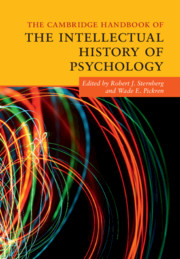Book contents
- The Cambridge Handbook of the Intellectual History of Psychology
- The Cambridge Handbook of the Intellectual History of Psychology
- Copyright page
- Contents
- Figures
- Tables
- Contributors
- Introduction
- 1 Major Paradigms and Approaches in Psychology
- 2 Methodology in Psychology
- 3 Neuroscience in Psychology
- 4 Sensation and Perception
- 5 Attention: Awareness and Control
- 6 Learning
- 7 Memory
- 8 Decision-Making
- 9 Creativity
- 10 Intelligence
- 11 Development
- 12 Social Psychology
- 13 Gender
- 14 Emotion
- 15 Motivation
- 16 Personality
- 17 Abnormal Psychology
- 18 Psychotherapy
- 19 Health Psychology
- Index
- References
18 - Psychotherapy
Published online by Cambridge University Press: 18 May 2019
- The Cambridge Handbook of the Intellectual History of Psychology
- The Cambridge Handbook of the Intellectual History of Psychology
- Copyright page
- Contents
- Figures
- Tables
- Contributors
- Introduction
- 1 Major Paradigms and Approaches in Psychology
- 2 Methodology in Psychology
- 3 Neuroscience in Psychology
- 4 Sensation and Perception
- 5 Attention: Awareness and Control
- 6 Learning
- 7 Memory
- 8 Decision-Making
- 9 Creativity
- 10 Intelligence
- 11 Development
- 12 Social Psychology
- 13 Gender
- 14 Emotion
- 15 Motivation
- 16 Personality
- 17 Abnormal Psychology
- 18 Psychotherapy
- 19 Health Psychology
- Index
- References
Summary
Psychotherapy encompasses a broad array of psychological procedures that typically address individual well-being or self-understanding. With diverse roots in hypnosis and persuasion, psychotherapy evolved from a marginal treatment option at the turn of the twentieth century to central modality in contemporary Western mental health services. Psychoanalysis dominated the theorical development and public image of psychotherapy in the first half of the twentieth century, even though its practice was largely restricted to a psychiatric elite. Input from the emerging field of clinical psychology saw the development of alternative behavioral and cognitive approaches in the 1950s, 1960s, and 1970s. These pragmatic techniques and accessible ideas were combined as cognitive-behavioral therapy and standardized in manualized form. Cognitive-behavioral therapy was more readily adapted to evidence-based paradigms than psychoanalysis, and evaluation research generally confirmed its efficacy. In recent times, the disciplinary basis for psychotherapy training and practice has broadened. While economic factors have prompted psychiatrists to move away from psychotherapy, especially in America, clinical psychologists have been joined by practitioners from other disciplines such as social work and psychiatric nursing. Despite the push for standardization, psychotherapeutic practice has remained eclectic. Psychotherapists continue to expand their professional remit, both upholding and challenging prevailing cultural norms.
Keywords
- Type
- Chapter
- Information
- The Cambridge Handbook of the Intellectual History of Psychology , pp. 468 - 494Publisher: Cambridge University PressPrint publication year: 2019
References
- 3
- Cited by

